#Sha monk
Text
PDFs of Foreign Language Journey to the West Translations
I’m happy to host a number of foreign language translations of the noted Chinese classic Journey to the West (Xiyouji, 西遊記, 1592 CE). This archive currently houses the following editions:
English
French
German
Hungarian
Italian
Romanian
Russian
Spanish
Thai
Vietnamese
As of this writing, I don’t yet have a modern Japanese translation. But you can read an original copy of the 1835 translation here.
I have also included translations of the unofficial sequel, A Supplement to the Journey to the West (Xiyoubu, 西遊補, 1640), in the following languages:
English
Hungarian
I will add more languages as they become available. Please let me know if you have access to other editions.
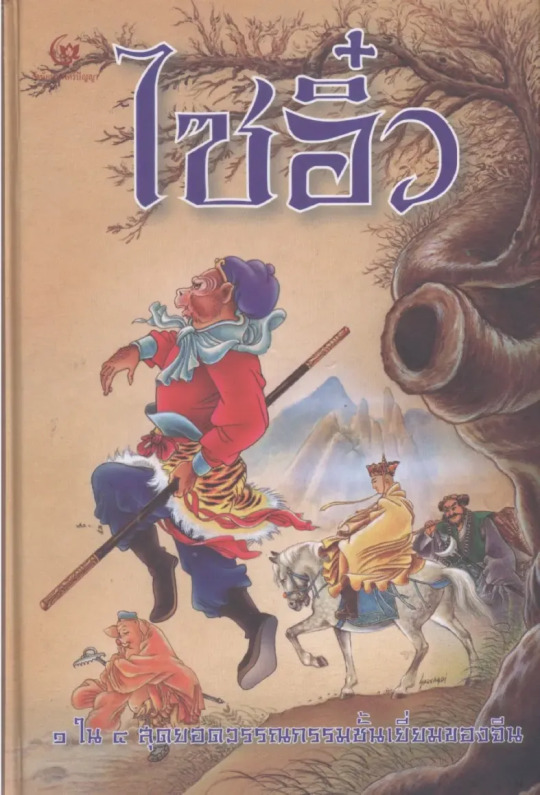
#Journey to the West#Xiyouji#Saiyuki#Sun Wukong#Son Goku#Goku#Monkey King#Tang Monk#Xuanzang#Sanzang#Tripitaka#Zhu Bajie#Zhu Wuneng#Pigsy#Sha Wujing#Sha monk#Sand Monk#Friar Sand#Sandy#Dragon Horse#White Dragon Horse#Chinese literature#Chinese mythology#Chinese religion#Buddhism#Taoism#lego monkie kid#jttw#LMK#translation
226 notes
·
View notes
Text
Chapter 56: Tripitaka and Wukong
(note: I just started reading chapter 56, so I don't have the complete information)
I found it super strange that Tripitaka is GENUINELY shocked that Wukong killed the bandits, I was under the impression he expected that of Wukong from watching OSP's videos. Like he doesn't even take Bajie seriously when he told him that the Bandits were killed.

at first I found it strange that Tripitaka straight up seemed shocked that Wukong killed them, when all he have been doing in the book was murder left and right, when I realised something. Most of these murders were done without Tripitaka's knowledge. In Tripitaka's perspective:
Golden and Silver horned demons - It is unsure if he saw the demon going into the vase.
Ghost King - no murder
Red Boy - no murder
Iguana Dragon - no murder
3 Daoist sage - 3 sages were killed though it would be hard to pin the blame on Wukong since he was sneaky about it
Guanyin's fish - no murder
Golden helmet demon - no murder
Kingdom of Women - no murder
Last time he saw Wukong kill someone was during the White Bone Demon arc at longest and at least it would be from the 3 Daoist sage. Did he believe that Wukong changed? What is more interesting is just seeing Tripitaka's reaction to the whole situation, he prays for the Bandits and is snappy towards Wukong, even going as far an insulting him. (Like even I was concerned, he never does that in story before, sure he may call his disciples ugly and all, but I cannot think of a time where he insulted them)

Tripitaka ask their souls to only file a complaint against Wukong, as he warned them and other 3 (Bajie, Wujing, and horse) took no part in this, which makes Wukong laugh and pins the blame on Tripitaka.
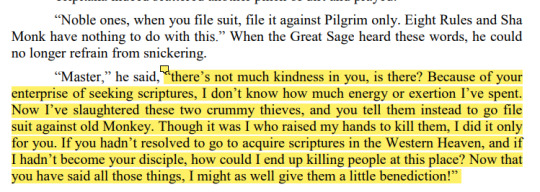
His argument is on the same level as teenagers who go "well I didn't ask to be born, so it is your fault" or "I didn't ask to go to school, so don't be surprised that I am failing." Which makes Tripitaka even more shocked and upset at Wukong who doesn't even show an inch of remorse during this whole situation. He even says that his prayer was meant to make Wukong appreciate life and become more virtuous, Which Wukong makes fun of.

It is so interesting to read these 2 during this arc so far because you can see how they are starting to become estranged to one another.
Tripitaka throughout this arc is so shocked and upset at Wukong's actions, while Wukong is showing no remorse and is instead finding humour in it and pushing the responsibility to Tripitaka, making this whole situation worse.
you can even see at the end of the last image Tripitaka is trying hard to contain his anger and not lash out and instead ignore this.
#jttw#journey to the west#jttw tripitaka#tripitaka#jttw tang sanzang#tang sanzang#jttw tang monk#tang monk#jttw sha wujing#sha wujing#jttw sha monk#sha monk#jttw Sun Wukong#Sun Wukong#jttw zhu bajie#zhu bajie#six eared macaque arc#guanyin#jttw guanyin#jttw bai longma#bai longma
18 notes
·
View notes
Text
Chapter Recap: Chapter Twenty-Two: Eight Rules fights fiercely at the Flowing-Sand River; Moksa by order receives Wujing's submission
This chapter begins with the three pilgrims proceeding swiftly through the Yellow Wind Mountain and then traveling without any special difficulty until autumn. Yet it is at this time that they come upon “a huge and turbulent river, its waves surging and splashing.” Tripitaka and Eight Rules are doubtful that they can cross it, and even Sun Wukong is left “somewhat frightened” by the ferocity of its waves and the fact that it is at least eight hundred miles wide. For while he “need only make one twist of his body” to “reach the other shore…for you, Master, it’s a thousand times more difficult, for you can’t traverse it even in ten thousand years!”
Anxious to cross but equally anxious at the dangers that lay in trying, Tang Sanzang soon discovers a slab of stone. All three pilgrims read it and discover that their most recent obstacle is the “Flowing-Sand River,” which is not only eight hundred miles wide but also three thousand miles deep. It is further composed of “weak water” so that even feathers and petals sink to its bottom. As the trio are going over these facts, a “most savage and hideous monster” with a “head full of tousled and flame-like hair,” a “pair of bright, round, eyes which shone like lamps,” “an indigo face, neither black nor green,” a neck adorned with “nine skulls” as a necklace, and wielding “an awesome priestly staff” suddenly bursts from the water. This yaoguai “went straight for the Tang Monk,” but Pilgrim Sun manages to pull his shifu to higher ground while Zhu Bajie engages this “fiend” in a battle. We also learn through a poem that just as Eight Rules was once the Marshal of Heavenly Reeds, this river yaoguai was once the Curtain-Raising Captain by the Throne, and that in years past they had met each other as deities in the Divine Mists Hall. Now, however, they fight ferociously for twenty rounds, with neither one emerging the victor.
Sun Wukong, for his own part, is standing guard over Tang Sanzang, Bai Longma, and the luggage. Yet he “became so aroused by the sight of Eight Rules engaging that fiend” that eventually the monkey “could not restrain himself,” and leaves Tripitaka’s side so that he could “go play with [the yaoguai] a little.” Ignoring the Tang monk’s pleas for him to stay, the Monkey King joins the fight “with a loud whoop” and leaves the river monster “so shaken” that he “dove straight into the Flowing-Sand River and disappeared.” This upsets Zhu Bajie greatly, who leaps about wildly asking Sun Wukong while he spoiled the battle. The Monkey King laughingly tells the pig that when “I saw how delicious your fight with him was…I jumped up here to have some fun with him.” The two soon return to Tang Sanzang “holding hands and teasing each other,” but they do have to tell Tripitaka about their failure to catch the yaoguai. The Tang monk also suggests that the river yaoguai might be a good person “to lead us across” the Flowing-Sand River, as he had “probably lived here for a long time.” Sun Wukong agrees, and states that when they catch this yaoguai they won’t kill him immediately but will “just make him take Master across the river before we dispose of him.”
All apparently agreeing to this plan, Zhu Bajie tells Sun Wukong to fight with the river yaoguai while he guards Tang Sanzang. The Monkey King, however, reveals with a laugh that “doing business in water somewhat cramps my style” because he either has to transform into a water creature or use one hand to wield a water repelling spell when dealing with that element. Eight Rules then states that he had once “commanded a naval force of eighty thousand men” and had thus “acquired some knowledge” of moving through water when he was the Marshal of the Heavenly River, but that he is afraid that the river yaoguai might “have a few relatives down there in his den, and I won’t be able to withstand him if his seventh and eighth cousins all come out.” As such, Sun Wukong proposes that Zhu Bajie fight with the monster a little bit before feigning defeat to entice him to the shore, whereupon “old Monkey will help you.” Eight Rules agrees to this plan, and immediately “leaped through billows and waves and headed for the bottom of the river.”
The river yaoguai, for his own part, is at home catching his breath. Yet he is forced to confront Zhu Bajie once again, with the pig demanding that this monster explain what he means when he says he’s “no demon or fiend, nor do I lack a name or surname,” even though he does “stay here and take human lives.” The river yaoguai then reveals through poetry how he was once the Curtain-Raising Captain in the South Heaven Gate, exalted by the Jade Emperor himself. Yet one day when the Queen Mother was giving the Festival of Peach, he had dropped and broken a jade cup, which so enraged the Jade Emperor that he immediately stripped him of his rank and finery and would have had him killed if the Naked Feet Great immortal hadn’t begged to free the ex-captain. So instead the Jade Emperor sentenced the ex-captain to exile on the shores of the Flowing-Sand River. Here the ex-captain had become a yaoguai who’s “eaten many men;/over and over I took human lives.” He then threatens to make Zhu Bajie his “minced meat sauce.” This so enrages Eight Rules—for “Old Hog is tempting enough to make people’s mouths water, and you dare say that I’m coarse, that I’m to be chopped up for a chopped meat sauce!”—that they immediately start fighting. They go at it for two hours with neither one prevailing.
Up on the shore, Sun Wukong watches the fight “with bulging eyes,” but he dares not intervene. Finally Zhu Bajie feigns defeat and makes for the eastern shore, the river yaoguai hot on his heels. The plan is ruined, however, when “our Pilgrim could no longer restrain himself. He abandoned his master, whipped out the iron rod, leaped to the riverside and struck at the monster’s head. Fearing to face him, the monster swiftly dove back into the river.” An infuriated Eight Rules calls Sun Wukong a “BanHorsePlauge” and “impulsive ape,” berating him for spoiling the effort. The Monkey King merely laughs and says they should talk to Tang Sanzang.
Returning to the monk, Zhu Bajie first gives his report before Sun Wukong suggests they bed down for the night “and let old Monkey go beg some vegetarian food.” The Monkey King quickly returns with a full bowl, laughing when Tripitaka suggests that they “go to that household which gave us the food and ask them how we may cross this river”; the family the meal is from, after all, live “about six or seven thousand miles” away. Eight Rules accuses Sun Wukong of fibbing, which leads the monkey to describe the merits of his cloud somersault, “which with one leap can cover one hundred and eight thousand miles.” Hearing this, Zhu Bajie asks Sun Wukong why he doesn’t simply carry Tripitaka to the Buddha. Yet when the Monkey King asks the pig why he doesn’t do so, for he too knows how to ride the clouds, Eight Rules states that the “mortal nature and worldly bones of Master are as heavy as the Tai Mountain…How could my cloud soaring bear him?” Sun Wukong says it’s the same case with him; “old Monkey knows every trick well, including becoming invisible and making distances shorter. But it is required of Master to go through all these strange territories before he finds deliverance from the sea of sorrows; hence even one step turns out to be difficult. You and I are only his protective companions, guarding his body and life, but we cannot exempt him from these woes, nor can we obtain the scriptures all by ourselves.” And after all, as Sun Wukong concludes, “What’s easily gotten/ soon forgotten.” Zhu Bajie accepts this all “as instruction,” and all three pilgrims eat some of the vegetarian food before going to sleep.
The next morning, Sun Wukong suggests that they try to pull the same trick as last time, promising that “this time I’ll try not to be impulsive.” After some complaining Eight Rules agrees to go along with it, and so dives back down to confront the river yaoguai. After the ex-captain gives a lengthy poem on the merits of his treasure staff, the two deities turned yaoguai start fighting in earnest “from the bottom of the river up to the surface of the water.” Zhu Bajie once again pretends to be defeated and flees, but the river yaoguai sees through it and refuses to go out on the bank. When Sun Wukong sees this state of affairs, “he became highly irritated” and tries to capture the monster nevertheless, but the river yaoguai “dove into the water and disappeared” before he has a chance. Eight Rules and the Monkey King are thus once again unsuccessful, and once again decide to talk to Tang Sanzang.
When he hears the news of this most recent failure, Tripitaka immediately starts crying. But Sun Wukong asks him to “please don’t worry,” as he’s going to leave for the South Sea to seek out Bodhisattva Guanyin again in hopes of her help while Zhu Bajie stays behind to guard the monk. The monkey leaves on this mission with Tang Sanzang’s encouragement and Eight Rules’ request to “please convey my gratitude to her for her kindly instructions in the past.” It takes Sun Wukong no time at all to reach the South Sea and the Potalaka mountain, and soon enough he prostrates himself before the bodhisattva. The monkey explains this most recent ordeal with “a monster in the river who is quite accomplished in the martial arts,” and asks her to “take pity and grant us deliverance.” Bodhisattva Guanyin, however, but asks Sun Wukong if he is “still acting so smug and self-sufficient that you refuse to disclose the fact that you are in the service of the Tang Monk?” The Monkey King is forced to admit that he had never brought the matter up to the river yaoguai. The bodhisattva chide Sun Wukong further, revealing to him that the “monster in the Flowing-Sand River…happens to be the incarnate Curtain-Raising Captain, who was also brought into the faith by my persuasion…Had you been willing to mention that you were a scripture pilgrim from the Land of the East…he would have yielded.”
There is, of course, the problem of this monster being “afraid to fight now; he refuses to come up to the shore and is hiding deep in the water.” Bodhisattva Guanyin thus summons her disciple Hui’an and gives him “a little red gourd from her sleeves” along with the instructions to “Take this gourd and go with Sun Wukong to the Flowing-Sand River. Call ‘Wujing,’ and he’ll come out at once. You must first take him to submit to the Tang Monk. Next, string together those nine skulls of his and arrange them according to the position of the Nine Palaces. Put this gourd in the center, and you will have a dharma vessel ready to ferry the Tang Monk across the boundary formed by the Flowing-Sand River.” Sun Wukong and Hui-an leave to carry out Bodhisattva Guanyin’s instructions “with the Great Sage carrying the gourd.”
Soon enough the Monkey King and Moksa meet up with Tang Sanzang and Zhu Bajie. Sun Wukong gives an account of what just happened and what he was told to do. Moksa, gourd in hand “and treading half on cloud and half on fog,” “moved directly above the surface of the Flowing-Sand River” and cries out the river yaoguai’s religious name, asking him why he hadn’t yet submitted to the scripture pilgrim. Wujing, who, “fearful of the Monkey King, had gone back to the bottom of the river to rest in his den,” swiftly leaps out of the water as soon as he hears Moksa calling, “all smiles” as he greets Hui-an but quickly souring when he spots Eight Rules and the Monkey King. Yet Moksa is able to smooth over any tension with some explanation, even though the river yaoguai is soon called a “bum” by Zhu Bajie, who asks Wujing why “did you not submit to me in the first place?” This time, it is Sun Wukong who calms the pig down, even stating that it’s “really our fault for not mentioning that we were seeking scriptures, and we didn’t tell him our names.” The river yaoguai then tells the Tang Monk that that Bodhisattva Guanyin already gave him “the religious name Sha Wujing,” and that he’s eager to accept Tripitaka as his master. At Tang Sanzang’s request, Sun Wukong shaves Sha Wujing’s head, and the river yaoguai thus becomes “the youngest disciple of the Tang Monk.” Tripitaka, when he sees that his newest follower “comported himself very much like a monk,” also gives him “the nickname of Sha Monk.”
The matter settled, Moksa then has Sha Wujing take off his skull necklace and arrange the skulls “after the design of the Nine Palaces, placing the gourd in the middle.” Tang Sanzang “thus embarked on the dharma vessel,” finding it to be “as sturdy as a little boat.” He is further “supported by Eight Rules on his left and Wujing on his right, while Pilgrim Sun, leading the dragon-horse, followed in the rear, treading half on cloud and half on fog. Above their heads Moksa also took up his post to give them added protection. In this way our master of the Law was safely ferried across the boundary of the Flowing-Sand River.” As soon as they reach the other side Moksa takes back the gourd, while “the nine skulls changed into nine curls of dark wind and vanished.” After receiving thanks from the Tang monk, Moksa goes back to the South and Tang Sanzang remounts Bai Longma, and the journey to the west goes on.
What adventures the now complete pilgrim group may encounter next is a question that will be answered in the next chapter.
#jtjttw chapter recap#xiyouji#journey to the west#jttw#sun wukong#monkey king#zhu bajie#zhu eight rules#tang sanzang#sha wujing#sha monk#bai longma#jttw reading group#jttw book club
15 notes
·
View notes
Note
what is sha wujing’s purpose in the story?
Oof there is a lot of way to answer that.
Entertainment wise he is meant to be the straight man of the group. Level-headed to balance Wukong's hot temper and Bajie's hot passion. He is meant to reign the other two in when Sanzang isn't there himself or if there needs to be more ribbing on either Wukong or Bajie. He does show to talk more in later arcs at least from what I notice either from encouraging Wukong to give teasing remarks to Bajie as well. He doesn't do pranks like Wukong does but rather just sly dry remarks at his expense.
Allegorical wise he is to represent Emotions and earth/ground (hence the sha in his name) Wukong is the Mind and Bajie is the Body and Bailong is the Will but Wujing is to show what an emotional mistake can direct the rest of your life.

There isn't a lot that was said when it came to the hows and whys of Wujing's punishment. Whether it was on purpose as a sign of disrespect or a true accident that was made in the heat of the moment. While we don't see any other reasons to be behind his accident I do like the theory that @antidotefortheawkward-art has about the implications of what a cup smashing could mean to imply 摔杯为号 meaning 'breaking a cup as a signal' to hint that an attack is happening usually at a banquet.
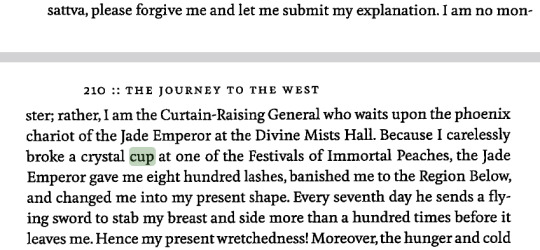


I think that would just add another layer of clever writing but if that is not the case I've heard that he smashed the cup in a fit of rage. Against who and to what, unknown, but that Wujing made a mistake at the height of his emotions.
Wujing has been seen as a voice of reason but there are quite a few outbursts that he has had throughout the journey, mostly letting his anger get the best of him but I think that might be his struggle to keep himself in check. Honestly, he seems the most serious when it comes to following the scriptures, seeing the pilgrimage as the true way to redeem himself. Whenever Bajie or even Wukong want to quick when things are getting too hard or even impossible he is the one to shake them back into it. He gives more than one pep talk in the book if I recall.
That is to say, he is very vicious as well when he can be, ruthless with his enemies and his words when he is pushed far enough. He was a cannibal that ate anyone that came to his river, still with a conscious mind of his life in heaven. He was turned into a demon that is without the largest build and the wildest looks but his personality does not fit his description. He doesn't get a lot of attention as Bajie is the more humorous one and Wuking is our main protagonist to save the day but he does provide that level of groundedness I think the team needs.
I also love that he has Nine Scripture Pilgrim's skulls around his neck, which to me highly suggests that Wujing mayhaps has eaten Sanzang's past lives.
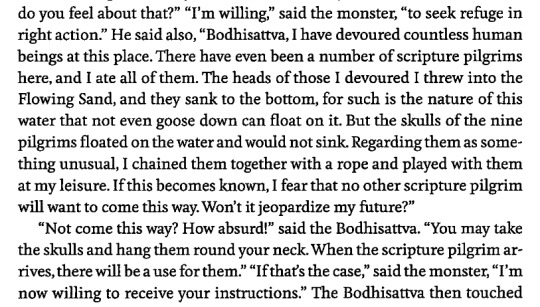

I think this is to still highlight his name meaning Sha Wujing and how it means "Sand awakened to Purity" to show how devoted he was to better himself not just for the sake of running away from his punishment but to become a better version of himself.

I think that honestly, Wujing is the most sincere in his desire to follow Sanzang, being very loyal and trustworthy even if he didn't have a lot to say. But when he did speak I think he always do so with meaning.
In the end, he became an Arhat one who gained insight into the true nature of existence but just short of reaching Buddhahood. It could be that he did not have enough merit as Wukong and Sanzang were the ones taking up most of the toil of the trails or that he was the last to join and simply missing a few more merits to allow him to ascend but I think he still plays an important role in showing that even just wanting to make a change is the hardest part to continue down a path a change.

Between Wukong's pranking on Bajie and Sanzang trying to reign Wukong's temperament in I think that his purpose was to provide a more neutral character to have a more logical outcome. I see a lot of interpretations of this character as being a more philosopher or inquisitive role. The gentle giant so to speak seeks knowledge for the sake of knowledge and I can see how this can derive from his origins. Or he has been a soft voice of reason, more emotional in his outbursts but well-meaning. Or he has been a huge brute of a man, trying to reign himself in but often speaking his mind first.
No matter how he is portrayed I always love him.
I hope that answers your question!
#sha wujing#sha monk#jttw#journey to the west#xiyouji#love this man#even if he big buff fish man or small skinny man#he is always perfect in every single piece#deserves the world#HE ONLY HAS 2 MOVIES ABOUT HIM#BAILONG HAS LIKE 5!#HOW IS THIS FAIR#THE DRAGON HORSE HAS MORE MEDIA ABOUT HIM!#UNJUST#ask
50 notes
·
View notes
Photo

#jttw sun wukong#jttw tripitaka#jttw sandy#jttw pigsy#jttw white dragon horse#sun wukong#bai longma#zhu wuneng#zhu bajie#sha monk#sha wujing#tang sanzang#journey to the west#journey to the west fanart#Zu's Art
20 notes
·
View notes
Text
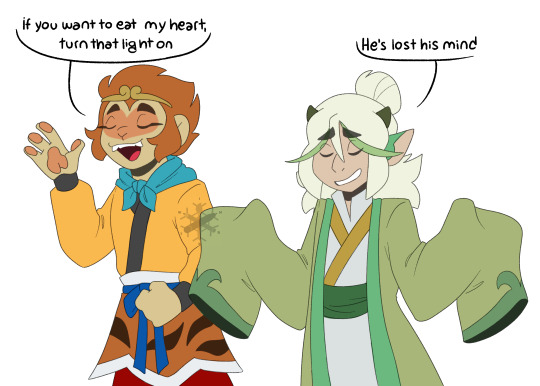
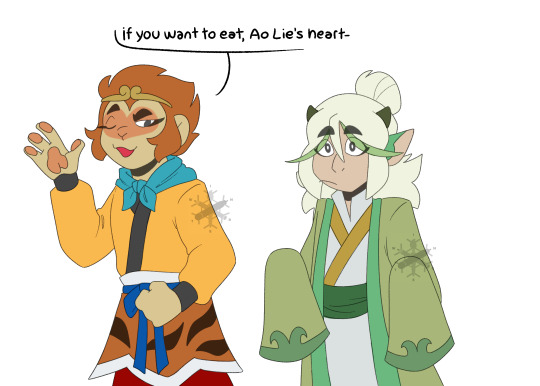
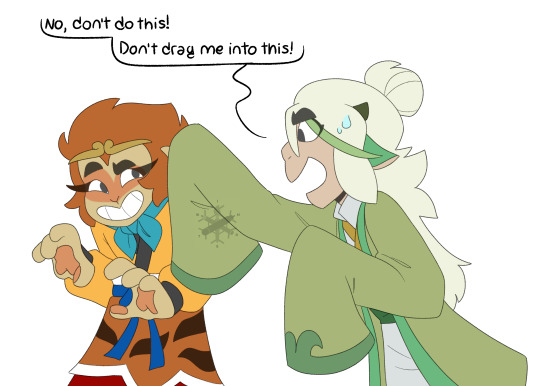
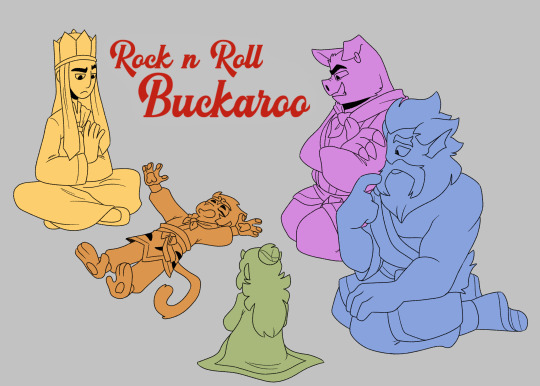
My friend @lunar-wandering mentioned that Wukong and Ao Lie have the same vibes as Shane and Ryan from Watcher and my brain spiraled from there
#lego monkie kid#monkie kid#jttw#journey to the west#sun wukong#monkey king#ao lie#bai long ma#bai longma#tripitaka#tang monk#zhu bajie#sha wujing#doodles#digital art#sai#winterpower98
2K notes
·
View notes
Text
I get that they're heavenly beings but do they ALL have to be HOT

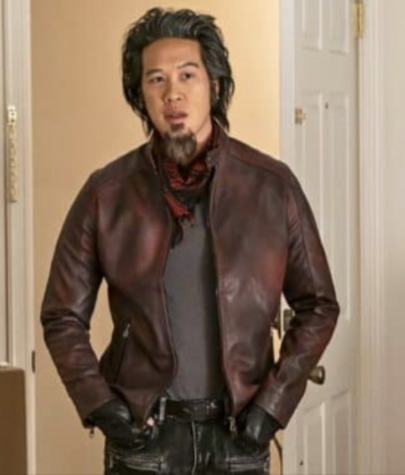
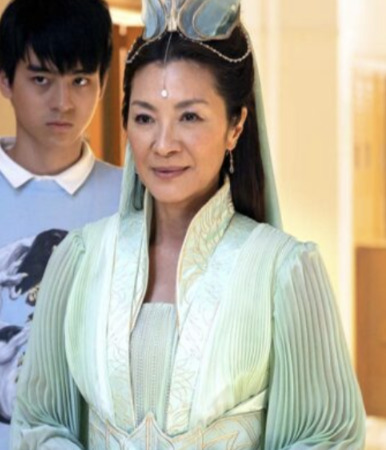
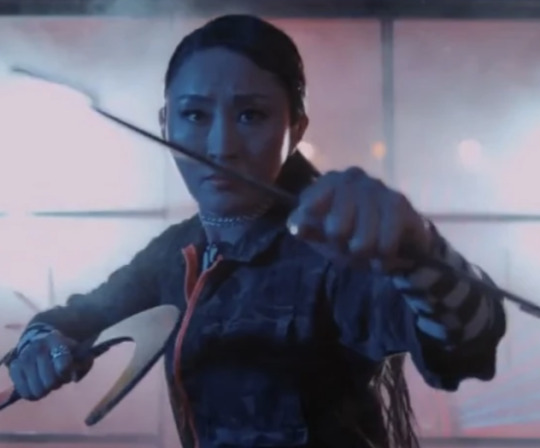

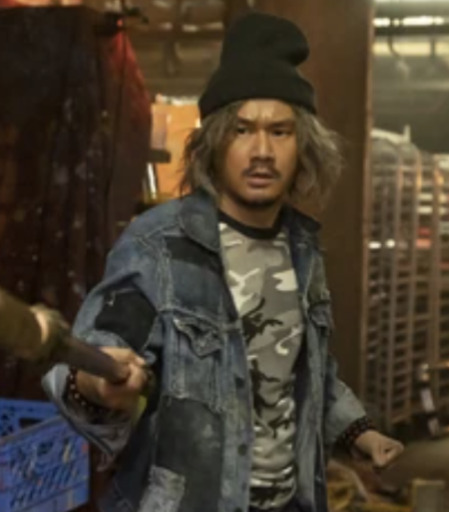


#YES im including pigsy.#ARMS#im also taking about bull and monkey forms here idc#american born chinese#honestly when i say hot im really just saying this character is aesthetically pleasing#sun wukong#niu mowang#guanyin#sandy#sha wujing#pigsy#zhu bajie#mad monk#ji gong#lady rocky#shiji niangniang#princess iron fan
48 notes
·
View notes
Text
Watched Monkey King: The One and Only on the youtube the other day and while as a totality it was a pretty meh experience (not to mention was clearly ripping off from other more popular monkey-king based films aafweefaw) it also provided some genuinely funny interactions like this:
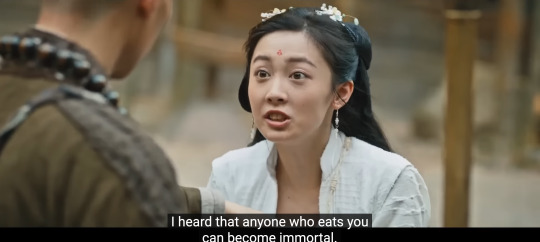
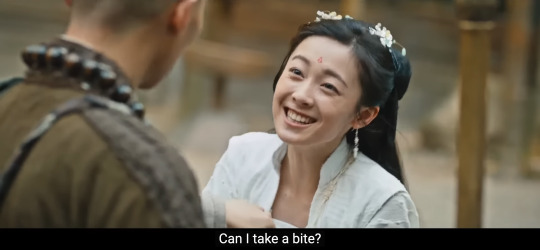

#monkey king: the one and only#jttw film#xiyouji film#tang sanzang#sha wujing#yaoguai#also damn#count the fox yaoguai lady here#and yet another character in the growing list#of sun wukong love-ish interests#who end up dying horribly so he can Be In Pain and Learn A Lesson :(#still#kudos to her for being very polite when asking the Tang monk if she can have a nibble#also i think there should be more done to explicitly acknowledge#that yeah the whole reason jttw Xuanzang needed all these bodyguards in the first place#was because basically everyone wants to eat him
198 notes
·
View notes
Text
cao niangzi is so valid
#‘this monk is trying to turn my handsome friend bald?? not on my watch 😤’#‘oh shit… monk dude is pretty as well’#skdjksjsjdjdjd#ali reads#sha po lang#spl#stars of chaos
2 notes
·
View notes
Text
Everyone knows that a teachers needs some students, so continuing this introduction to this ancient text, we have what I assume the three secondary characters of the journey.
Everyone give it up for: Zhu Bajie the demon? Pig, Sha Wujing the ogre, and Bai Long Ma the horse/dragon! The last disciples of Tang Sanzang, and Sun Wukong's companions.
It seems that these three have more of a cultural symbolism that is tied to buddhist religious practices rather than the whole weight of culture + religion + literary tradition that Tang Sanzang, and Sun Wukong have on their characters. Which is something a little nice since it means they are a little bit "lighter" in the narrative.
Zhu Bajie is a very humanoid looking pig demon that already has the now global symbolic depiction of pigs in literary works. A metaphor for a gross, lazy, and aggresive person that doesn't have anything that emotionally connects them to this earth, and instead is focused on their own self desire without considering anyone around them. Very straightforward, and clear; Zhu Bajie's role seems to be mainly comedic, and an example of dynamic contrast between the now established overly ambitious monkey king.
Sha Wujing seems to be an ogre who was once a heavenly figure (if he was punished by the Jade Emperor who is a god) with really bad luck since he broke by accident a valuable something during a festival. Since Sha Wujing's transformation, and expulsion from the heavens are a punishment, and it's mentioned that his current name is a buddhist name then I can assume that Sha Wujing's story is mostly a chance for redemption for his mistakes by helping Tang Sanzang (a buddhist monk) to go to the west. A very normal story to tell.
HORSIE/DRAGON BAI LONG MA. I'm sorry, but the second I read that he is dragon that can turn into a horse I fell in love with, and I declare that he has done nothing wrong in his life, ever. Who cares if he broke a pearl bestowed upon him? It was his pearl Bai Long Ma could do whatever he wanted with it, that is so unfair. Anyway, he is the best character in this novel because he is a dragon.
Also, to add, I don't know who this Guanyin lady is, but she sounds really badass already.
#What happens when a monk a horse a monkey a pig and an ogre make a summer trip? They head west#Where was that quote? The one that says there are only two types of stories#A man goes on an adventure or a stranger arrives on a town#Yeah I think this book will have a lot of that#Anyway let's wait for the journey to start!#journey to the west daily#journey to the west#zhu bajie#sha wujing#bai long ma
2 notes
·
View notes
Text
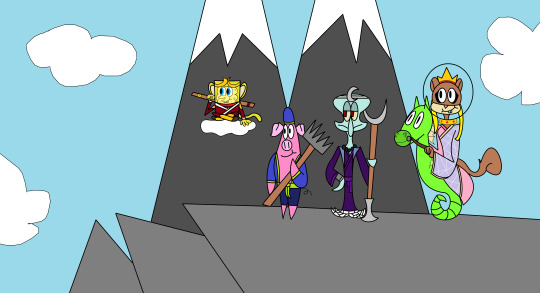
After seeing Netflix's recent Adaptation of Journey To The West that made Me want to Re-watch the 60s Animated Movie "Alakazam The Great" (which was my actual exposure to that Story), My brain then thought "Ya know, since SpongeBob tends to Parody Stories and Other Pop Culture stuff so much, why didn't they bother to just do their own version of the Famous Chinese Story?" and so I just randomly had to drew this because of that random thought.
SpongeBob as Sun Wukong, Patrick as Zhu Bajie, Squidward as Sha Wujing, and even Sandy as Longevity Monk.
SpongeBob SquarePants (c) Stephen Hillenburg and Nickelodeon
Journey To The West (c) Wu Cheng'en
#spongebob squarepants#journey to the west#journey to the west au#spongebob#patrick#patrick star#squidward#squidward tentacles#sandy#sandy cheeks#crossover#crossover fanart#sun wukong#zhu bajie#sha wujing#longevity monk
5 notes
·
View notes
Note
I’ve been doing my best to find proper descriptions of the pilgrims’ appearances, but my search results are being frustratingly vague, and the novel itself has a habit of giving this information in small, dispersed increments (which I struggle to find)—not to mention one or two costume changes on Monkey’s end.
So, I must ask, do you have any reliable sources for the crew’s physical appearance?
(Sorry if you’ve been asked this before!)
Sun Wukong - https://journeytothewestresearch.com/2018/05/30/what-does-sun-wukong-look-like-an-artist-and-cosplayer-resource/
Zhu Bajie - https://journeytothewestresearch.com/2021/08/08/what-does-zhu-bajie-look-like-a-resource-for-artists-and-cosplayers/
Everyone's height and also Tripitaka's description - https://journeytothewestresearch.com/2023/04/17/how-tall-are-the-main-characters-from-journey-to-the-west/
Sha Wujing's face and early clothing - https://journeytothewestresearch.com/2018/03/24/the-origins-and-evolution-of-sha-wujing/
#asks#Sun Wukong#Monkey King#Tripitaka#Tank Monk#Tang Sanzang#Xuanzang#Zhu Bajie#Pigsy#Zhu Wuneng#Sha Wujing#Sha Monk#Sandy#Journey to the West#JTTW#Lego Monkie Kid#LMK
56 notes
·
View notes
Text
Do the JTTW pilgrims really represent the five elements? I’ve seen it referenced like 3 different times the Wukong, Tripitaka, Wujing, Bajie and BaiLongMa represent the five elements Fire, water, wood, metal, and earth to show how they work in harmony but NOWHERE does it say which pilgrims represents which element. Is it simply saying they get along SIMILAR to the five elements and they don’t actually represent them?
The closest I got was the video game Saiyuki where Sanzo (Tripitaka) can use wood scrolls, and Goku (Wukong) uses fire scrolls, Gojo (Wujing) is water, Hakkai (Bajie) is Earth and Ryorin (BaiLong) is metal
I don’t know any basis for the video game but it’s the only one that’s been clear
if anyone has like an actual source or article or just a reference (yes even pop culture media) then please send my way I just want to get to the bottom is this.
#jttw#journey to the west#its called journey to the west not destination to the west jttw#sun Wukong#zhu bajie#sha wujing#bai long ma#monk tripitaka#tang sanzang#son goku#saiyuki journey west#PlayStation#monkie kid#lego monkie kid#lmk#mk
40 notes
·
View notes
Text

#sha wujing wednesday#sha wujing#and what would any of us do without dear sand monk?#world's most chill former cannibal
105 notes
·
View notes
Text
Monkey King: Arena of Heroes (2022) 跨越神话 的冒险之旅
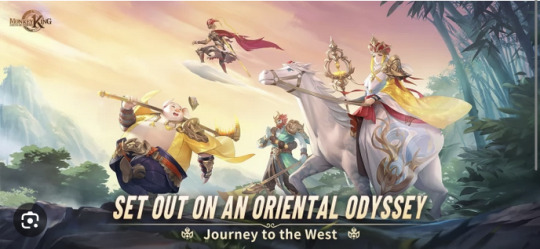
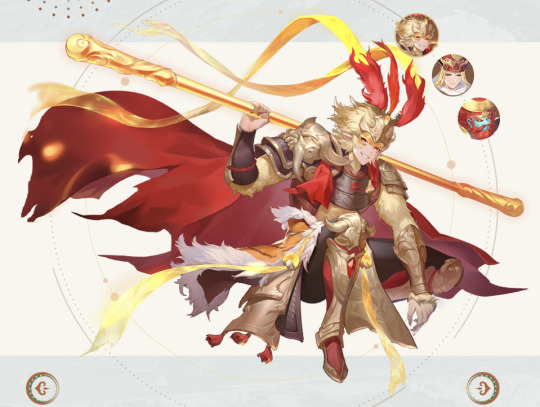
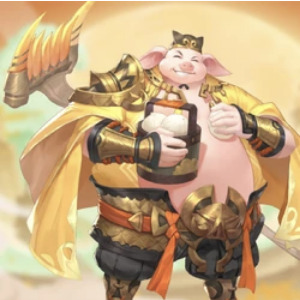
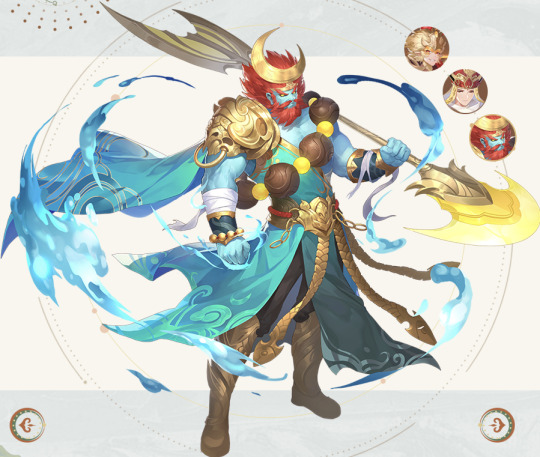
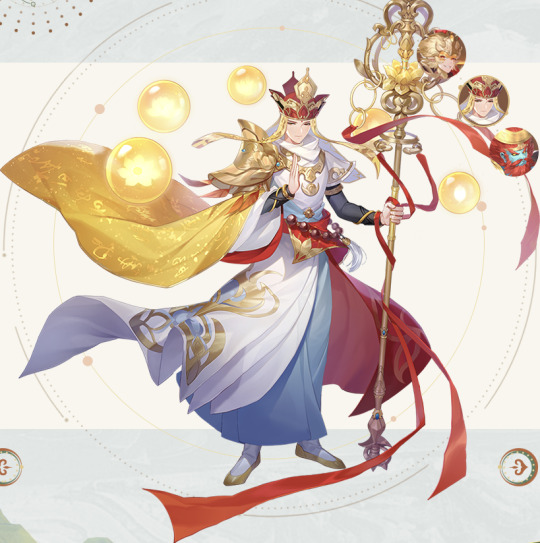
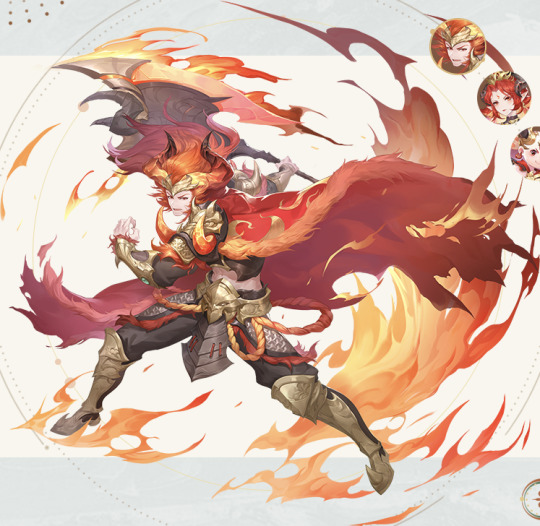
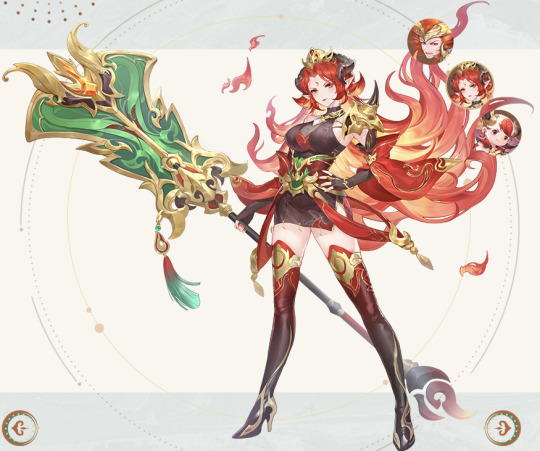

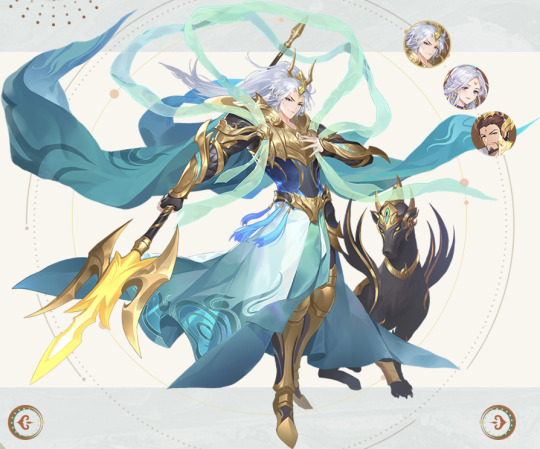
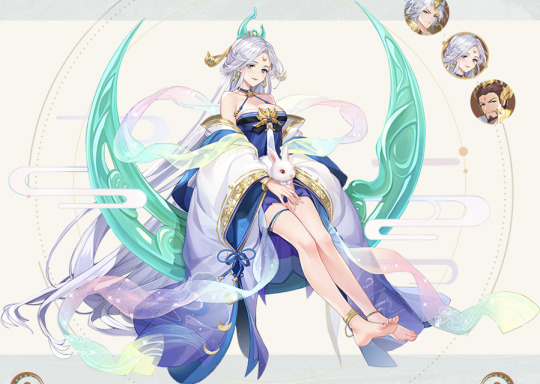
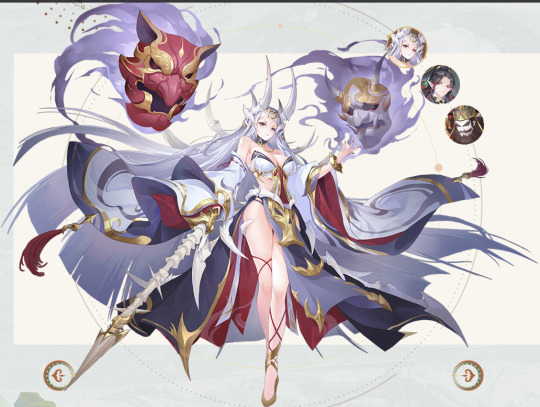
Date: April 7, 2022
Platform: PC / iPhone / iPad / Andriod
Developer: Playbest Limited
Publisher: Playbest Limited
Genre: RPG
Theme: Stylized / Anime
Also known as: Legends of Wukong: Demon Arena
Type: Retelling
Summary:
Epic Oriental Mythology RPG Monkey King: Arena of Heroes is here! Join Monkey King and Tang Monk on an epic journey from ancient China to the West in search of sacred sutras!
Take part in intense 6v6 RPG card battles, collect hundreds of heroes, and build up your team on the way to the champion of four realms. Don’t miss out on the lifetime free daily 10x draws!
Source: https://www.monkeykingaoh.com/en
Link: https://www.youtube.com/watch?v=N_KE8nWKYTM
#jttw media#Monkey King: Arena of Heroes#跨越神话 的冒险之旅#Legends of Wukong: Demon Arena#video game#game#sun wukong#Playbest Limited#retelling#rewrite#zhu bajie#tang sanzang#monk tripitaka#sha wujing#bull demon king#red boy#li zneha#princess iron fan#white bone demon#white bone spirit#li nezha#erlang shen#yang jian#chang'e#king li#li jing#rat demon#white mouse spirit#golden nose rat#da peng
89 notes
·
View notes
Text
Somewhat messy sketches and a preview image

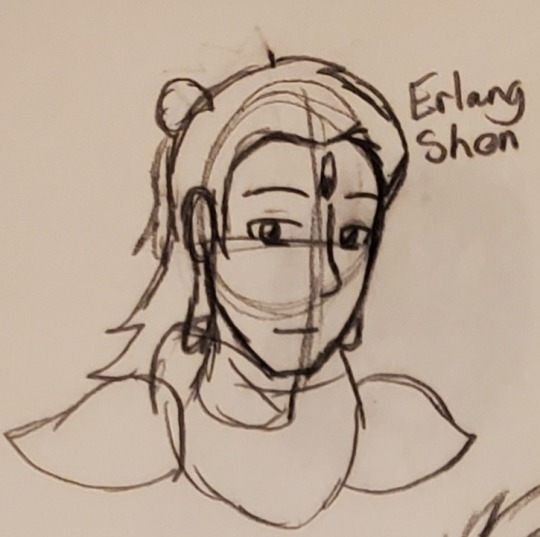



Drew some Wukong and other folks and things are getting a bit out of control and I have a story in mind with other Pantheons/Angels/Demons showing up because i have like 0 self control lol
Still figuring out Wujing, Bajie and Erlang's designs and I'm looking for inspiration for other characters (Six Eared Macaque, whom I'm calling Six, and Wukong are pretty set in stone. Haaaaa jokes)
@sketching-shark hope it's okay to tag you
#things dark does#jttw#jttw fanart#my journey thru the monkey and the monk#journey to the west#sun wukong#erlang shen#sha wujing#zhu bajie#oc: dark
7 notes
·
View notes